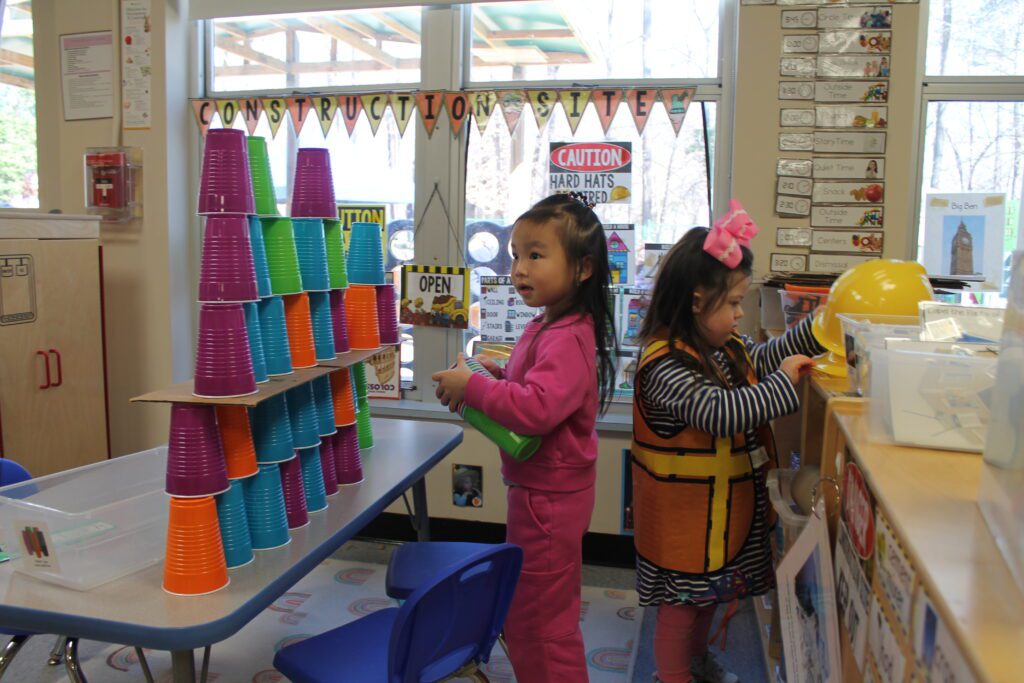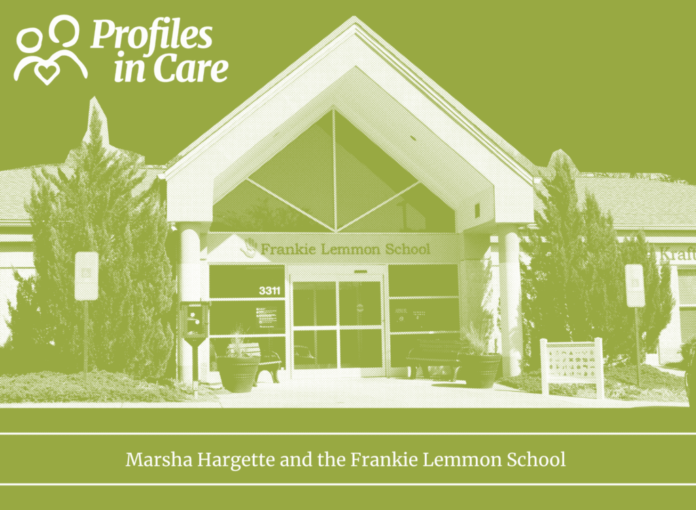EdNC is highlighting the experiences of educators, families, researchers, and advocates with a stake in North Carolina’s early care and learning landscape. These profiles illustrate that care and education are inseparable, especially in a child’s first five years — caregivers educate, and educators care. In this series, we refer to those profiled in the way they are known by their community.
Marsha Hargette is a native of Rocky Mount who was looking to return to North Carolina after some time living in Virginia. It was 2019, and her son and daughter were both elementary-school age. Her daughter has a rare neurological disorder, and Marsha was searching for a school that could meet her special education needs. She was also looking for a job.
That’s how she found the Frankie Lemmon School & Developmental Center, a nationally accredited five-star early care and learning site in Raleigh that serves students with and without disabilities.
“I’m so passionate about the work that Frankie Lemmon does, and I really believe that children deserve more than what they’re getting right now, and my goal is to see that through,” Marsha said.
Frankie Lemmon School
Marsha now works as the executive director of the foundation that supports Frankie Lemmon.
“The foundation’s sole purpose is to raise money and awareness for the school,” Marsha said.
The school was founded in 1965 by Frank and Georgia Lemmon. Their son Frankie had Down syndrome, and they were struggling to find a school that could meet his needs. Public schools weren’t required to accommodate students with learning differences until the passage of the Individuals with Disabilities Education Act (IDEA) in 1975.

Frank was a pastor, and his congregation joined to establish a school for a handful of 5- and 6-year-olds with disabilities in their community. The school existed in church basements serving preschool and kindergarten students until 2016, when it moved to a dedicated school building in east Raleigh.
Now Frankie Lemmon serves 95 students between the ages of 2 and second grade. (The students in first and second grade technically attend the Frankie Lemmon Academy, which will ultimately move to a new building on campus that will serve students through eighth grade.)
Each classroom has a lead teacher, most of whom have master’s degrees in special education, and two teaching assistants, regardless of class size, which currently ranges from five to 14. The school also has a full-time speech pathologist, occupational therapist, physical therapist, and social worker on staff. Between the school and the foundation that supports it, there are about 50 staff members.
Notice: JavaScript is required for this content.
It costs $4.5 million each year to operate everything. The foundation has historically raised these funds through events such as the Triangle Wine and Food Experience, which has been held annually for more than 30 years.
“This year we knocked it out of the park,” Marsha said. “We raised 3 million dollars in three days.”
Marsha said it costs about $48,000 per year to serve each student, but very few parents pay any tuition, and those who do pay deeply discounted rates. That’s because of the work she does with the foundation, and how the school blends funding from Wake County Public School System and NC Pre-K — plus private school vouchers known as “Opportunity Scholarships.”
‘What’s best for the child’
“Children with special needs are so highly underserved,” Marsha said. “And they are being left behind at a rapid pace.”
Their inclusion in education settings is something that Marsha will get “on my soapbox a little bit about.”
“Inclusion doesn’t necessarily mean just throwing a bunch of kids in a room together,” Marsha said. It requires intentionality.
Each year she and the school’s leadership get together in what she calls the “war room” where they have pictures of and information about every incoming student. They create classrooms that have the right mix of teachers, support staff, and students — including students without special education needs.
These students might be assigned to the school through NC Pre-K, or they might be the children of Frankie Lemmon teachers, or siblings of other Frankie Lemmon students.
“Whenever we’re making a decision, at the end of the day it’s what’s best for the child,” Marsha said.
Marsha said she recognizes that most public schools just aren’t given the resources to practice inclusion with this level of intentionality. That’s why Frankie Lemmon is needed.
“We’re not saying we’re the best fit for everybody, but we are really good at what we do,” Marsha said.
‘Invest it now’
Marsha’s daughter was too old to attend Frankie Lemmon School when her family moved to Wake County in 2019. At that time, FLS served primarily preschool and kindergarten students. While the school has since expanded into first and second grade with its Frankie Lemmon Academy, Marsha said she believes the school’s greatest value is to its youngest learners and their families.
“So many parents come in here at the very beginning of the journey with school, like a lot of them have been at home, so this is their first time being in a social learning setting, and it is just as much a journey for them as it is for their child,” Marsha said. “Learning how to navigate that, and for us to be able to be that support for them, it’s an honor to be able to do that.
“I think the need is just so great with kids with special needs, and they are capable of making so many gains. When you meet them where they are, and you give them that foundation — kids are just sponges, and they’re so formable.”
Marsha shared that when they opened the first-grade classroom in August 2023, the teacher set goals for her students to reach by the following June. The students had met every goal by Thanksgiving.
“It’s proof that if you can give kids in these formative years what they need… we can help build that foundation and hopefully break through ceilings that have been placed on them,” Marsha said.
Marsha said her best days are the days when she sits in on teacher meetings.
“They go around and every single teacher talks about their [students] and what’s going on in their lives and the gains and the challenges that maybe they’re facing and how best to support them,” Marsha said. “We do that with every single child… and as a parent, that makes me so happy that their kids are so loved, and that there’s a team of people that are clapping and rooting for kids. And that just doesn’t happen enough in the world, that we’re rooting for one another.”
It’s what Marsha wants for her own kids. “It’s what every child deserves,” she said.
That’s why Marsha has a message for policymakers when it comes to investing in early care and learning, especially for students with special needs: “Invest it now,” she said. “They grow up. And it gets more expensive as they grow.”
